The Rector’s Programme Opening Forum: Make Good Things Happen
By Ong Lishan (Industrial and Systems Engineering + USP, Class of 2016)
Lishan is a student writer for USP Highlights.
Published: 10 September 2015
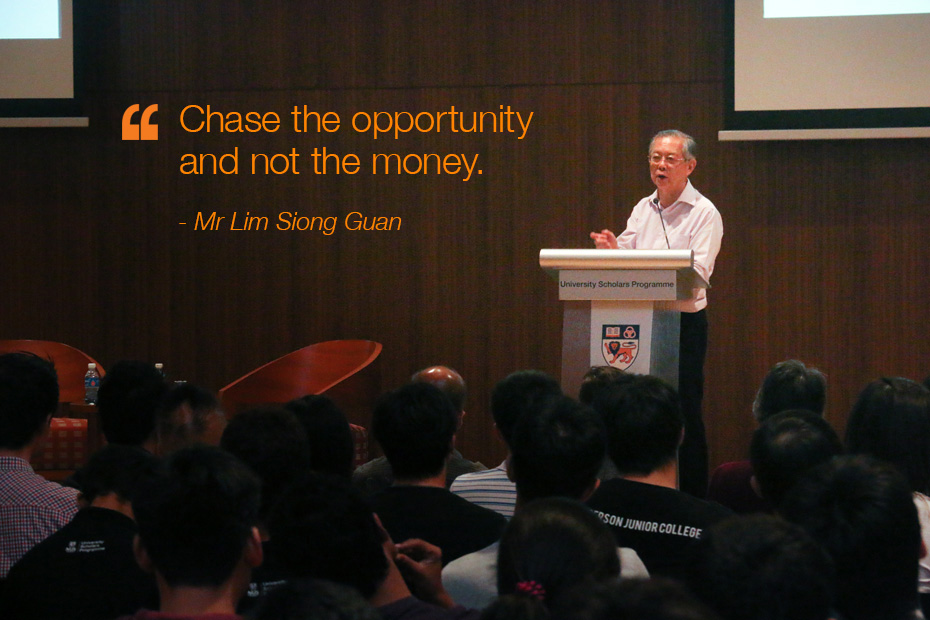
It is not every day that one gets to see and hear Mr Lim Siong Guan share his insights and wisdom. On 1 September 2015, USP students got to do just that, at the Opening Forum of The Rector’s Programme.
The Rector’s Programme (TRP) aims to develop USP students’ intellectual aspirations, career directions, and social responsibility beyond the University, thus empowering students to lead a purpose-driven, meaningful, and impactful life. Ms Euleen Goh, USP’s new Rector, kickstarted the TRP series with Meet-the-Rector Session on 25 August, speaking about how her life has shaped her purpose and principles. Throughout this semester, various external speakers will join in the TRP, with Mr Lim Siong Guan leading the pack with “Make Good Things Happen.”
From Singapore’s early years of government to her emergence as a prosperous nation-state, Mr Lim has dedicated his life to civil service. He is Group President of GIC, which he joined in 2007. He was previously the Chairman of the Economic Development Board and Head of the Singapore Civil Service and Permanent Secretary in various ministries. He is an adjunct professor at the Lee Kuan Yew School of Public Policy, a Senior Fellow of the Civil Service College, and the author of the best-selling book on leadership and governance, “The Leader, The Teacher & You.”
What Do We Need in a VUCA World?
Today’s world is a VUCA world: Volatile, Uncertain, Complex, and Ambiguous. According to Mr Lim, this is a complexity that we cannot fully understand. He said, “the way we go ahead is not by trying to figure out the complexity, then come to a logical conclusion from there. Instead, I believe that you need to start with a vision, and work through how the vision can be a facilitator or be supported by what you’re going to discover in the world.”
In crafting this vision, it is crucial to chase the opportunity and not the money. Mr Lim said, “Money is only going to pay you for what you know today. Opportunities are going to give you the knowledge and additional capacity and capability for the future.”
Executing this vision then requires self-confidence, courage, wisdom, judgment, and values. Mr Lim emphasised that wisdom comes from experience, but mostly from the experience of failure. “So the next time you get a failure, clap your hands and tell yourself you’re going to get wiser. It’s true!”
Mr Lim said that our values serve as an important compass in a world where maps do not exist because nobody has gone that way before. Although our values are ingrained in us from a very young age, he reminded the audience that we still need to be aware of how we are inclined to think and act. Sometimes, we only know our values in times of crisis.
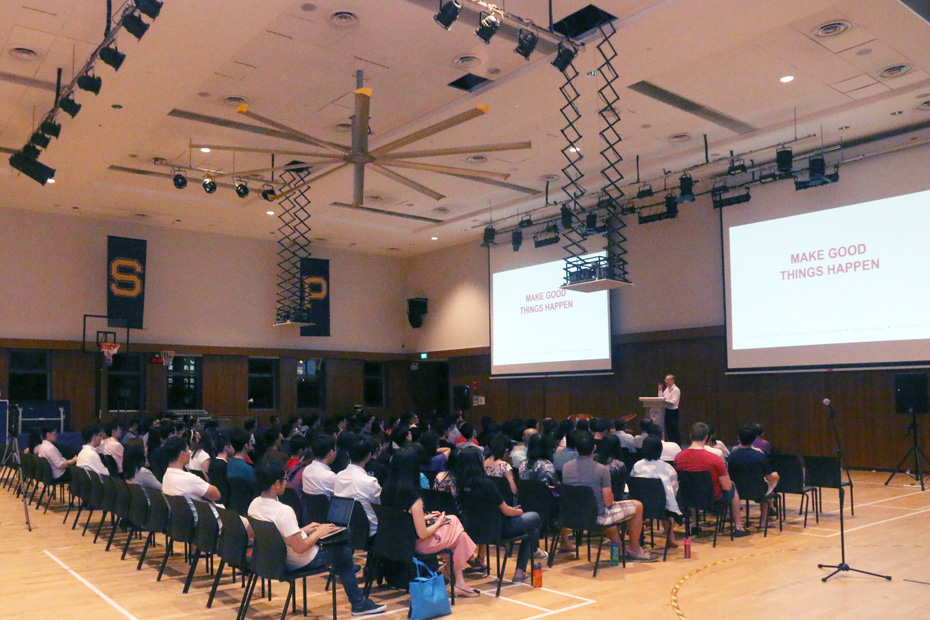
Re-conceive, Re-imagine
Having read “all 4.5 centimetres of the biography of Steve Jobs,” Mr Lim shared what he thought to be the most important page from Jobs’ biography; the page that only has: “The people who are crazy enough to think they can change the world are the ones who do”, a line quoted from Apple’s 1998 Think Different advertising campaign.
He noted that some people have the misconception that they need to learn a lot of knowledge before they attempt to change the world. “Luckily for you, you don’t have to; a lot of knowledge will be what your generation will create. But we need to be crazy enough to want to change that world,” Mr Lim encouraged.
“There is no new technology in the iPhone. Steve Jobs had to rely on established technology but what he did was to re-conceive and re-imagine,” he added.
Similarly, Singapore, despite her lack of natural resources, is the result of innovation and enterprise. “The question is whether we can continue to have that. At least try to change the world that you connect with each day.”
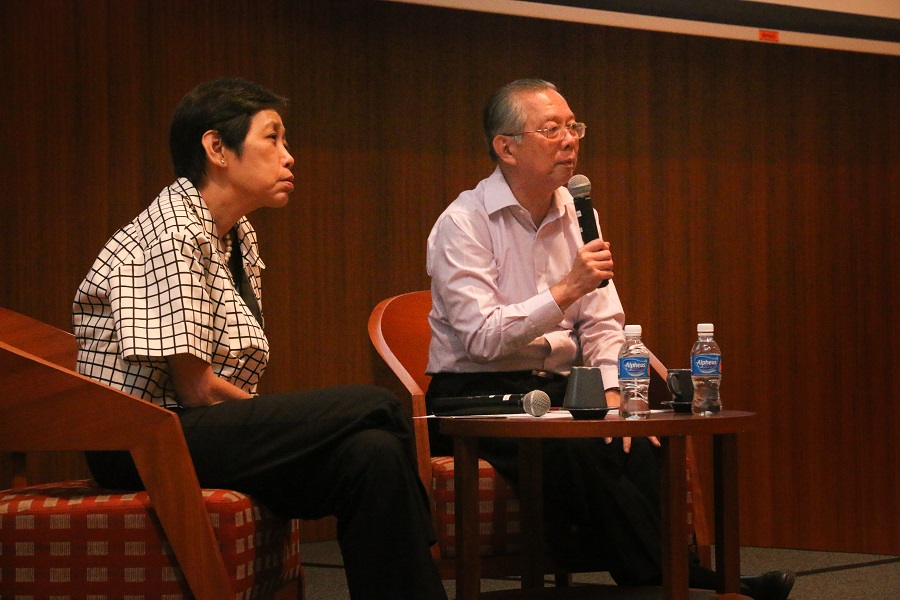
Q&A with USP Rector Ms Euleen Goh and Mr Lim Siong Guan
On Leadership and Values: Make Good Things Happen
Mr Lim made his main point loud and clear, “leadership is making good things happen which on their own would not happen. If something is going to happen without you being around, then the biggest favour you can do to people is to ensure that you do not slow down the process.” As I was listening in the audience, I thought Mr Lim’s qualified and nuanced definition of leadership deeply drove home our role as active change initiators and change catalysts in society, instead of passively riding along on the successes of other leaders.
Mr Lim questioned the idea of goodness. Creatively, he conceptualised an updated version of Maslow’s Hierarchy of Needs, which among other newly proposed needs, had the highest need of transcendence – helping others achieve self-actualisation. Given that Maslow’s theory was proposed in 1943, Mr Lim’s emphasis on transcendence, is, to me, a reminder that modern times have allowed us to fulfil lower level needs, and we are now more able to live more for others than ourselves. “We need to move towards other-centredness and away from me-centredness,” said Mr Lim.
Similarly, he contrasted resume virtues and eulogy virtues, concepts popularised by New York columnist David Brooks. According to Brooks, resume virtues are skills we bring to the marketplace; eulogy virtues are ones talked at our funerals. In Brooks’ New York Times column, the Moral Bucket List, eulogy virtues equate to “whether you were kind, brave, honest or faithful. Were you capable of deep love?”
Three Emerging Risks
While Mr Lim had surely lifted the morale and confidence of the audience, he warned that today’s world is plagued with three emerging risks: failure of leadership, lack of thinking, and the rise of relativist secularism.
“The failure of leadership occurs when people who are supposed to be leaders are not leading,” said Mr Lim, citing the example of poor governance in many countries today. Failure of leadership manifests during crises, but good leadership is supposed to prevent crises, or to develop the strength and ability to deal with crises.
Additionally, he expressed that especially in the internet world, there is a large proportion of created content, which can be untrue. “If we ought to be logical about it, we ought to be reacting to what is true. We need to think for ourselves.” Also, he cautioned against confirmation bias – such as by repeatedly looking at websites and topics that we like or agree with. “After some time, we keep talking to ourselves.”
Lastly, the rise of relativist secularism is a concern. Mr Lim described secularism as the phenomenon where standards are not based on the past (such as religious norms and the wisdom of ancient cultures). “These cultures have survived, this is how wisdom is perpetuated, and bad ideas are discarded.”
“Today, people choose what is convenient and comfortable for themselves, and the soundness of standards is relative.” He aptly cited the example of the Libor Scandal, where banks were discovered to have falsely inflated or deflated their rates so as to profit from trades or to give the impression that they were more creditworthy than they were. A bank he questioned said that although its information was false, it was closer to the truth than the other banks. Such a mentality that “it’s okay to cheat/lie as long as you’re not the biggest cheat/liar” is what Mr Lim considered relativist secularism.
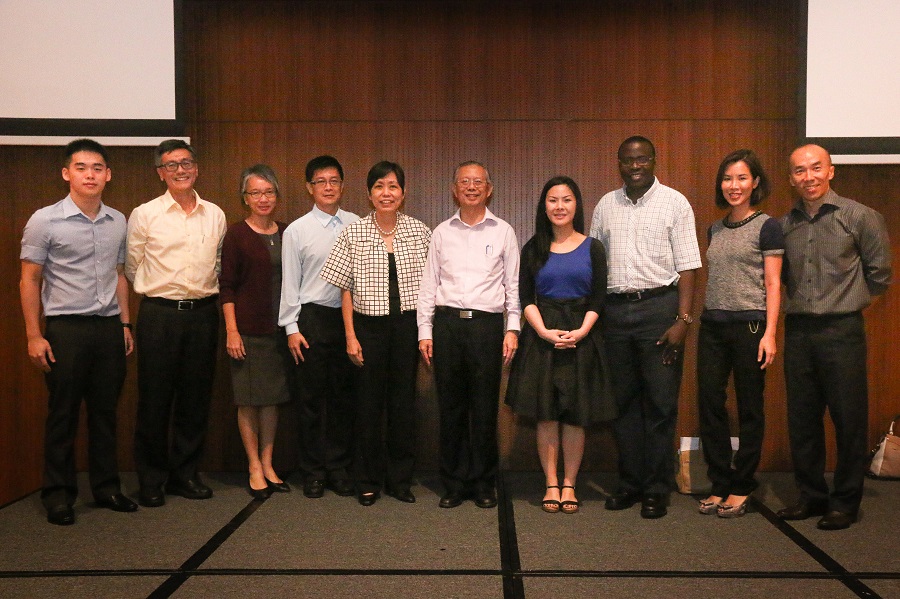
USP is honoured to have Mr Lim Siong Guan and his daughter cum book co-author Ms Joanne Lim (fourth from right), as well as the presence of guests from various residential colleges and Centre for Future-Ready Graduate at the TRP forum
The Leader, the Teacher and You
Summing up, Mr Lim said that success is about being the best that we can be, and creating the environment that allows people to be the best that they can.
To do this, apart from the ITCH traits (Imagination, Tenacity, Courage, Humility), we need to “observe, think, try, learn, lead, stand, and serve.” Good leadership is underpinned by genuine servitude and generosity, not in hoarding power or knowledge.
That night, a lot of acronyms and lists were flashed on the Powerpoint slides. As young twenty-somethings, much of what Mr Lim’s advice may seem difficult to relate to. Nevertheless, they are valuable words of wisdom, gleaned from years of selflessly serving the nation. And they are worth noting down and keeping in a safe place, to be referred to frequently and consciously. These could serve as a reminder and guide, regardless of whether we are thirty, forty, fifty or sixty, or seventy years old.
Let’s make good things happen.
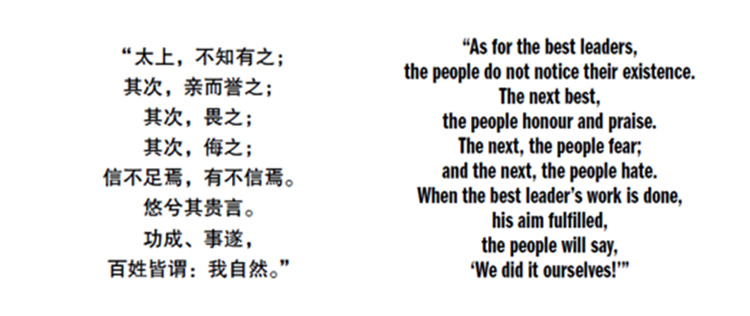
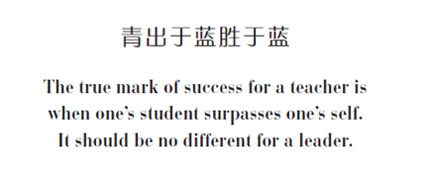
Images obtained from Mr Lim’s blog
Many of the topics shared during the talk can be found in Mr Lim’s book, “The Leader, The Teacher & You”, which encourages leaders to empower those they lead and spur their followers on to excellence. He cites many lessons based on his experiences under the leadership of Mr Lee Kuan Yew and Dr Goh Keng Swee. He also blogs at https://theleadertheteacher.wordpress.com/.

